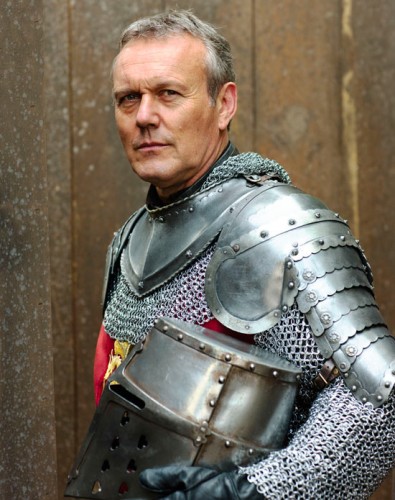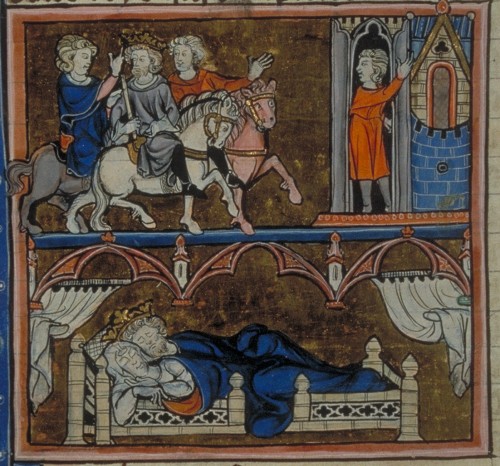Punnery aside, there is much more to Geoffrey’s Uther Pendragon than the simple bit of wordplay that allows Arthur to add the allure of dragons to his already alluring legend. The story of Arthur’s father was integral to the project of containing Arthur’s capital and providing an explanation sufficient to his reputation. But wordplay is a good place to start our discussion of him, nevertheless.

Uther is a terrible name for a character with the good fortune to be played by the former Mr. Rupert Giles.
As Milton learned from Nennius’s notist, the name Uther in Welsh means “the terrible one”, derived from the adjective uthir/uthyr, with all the associations that both terrible and terrific once had but which the implacable force of linguistic erosion has today nearly worn away. Just as “awesome” once conjured up the awe we reserve for the divine, “terrible” got its force from the “terror” we might feel before the truly powerful and impressive, the fearsome and formidable who are “terrific” because of their power and its potential both to “terrorize” and “terrify” those who they turn it upon. Think Ivan the Terrible, yes, but also Peter the Great. And as Milton noted, the name Arthur is often glossed the same way, “the terrible/terrific one.” ((Though Arthur might just be a bear deity masquerading as man, depending on who you believe.))
Pendragon also has a clear Welsh etymology; it’s a compound of “penn/benn” and “dragon”. The former means “chief”, “leader”, or “head”, and the latter does actually mean “dragon” in the snarly fire-belchy here-be sense, but it was also a poetic Welsh kenning for “warrior”. Thus, taken together, “Uther Pendragon” is a fitting name for any character in a position of leadership and power, marking him off as “the terrible/terribly formidable leader of warriors.” It’s not a title that crops up very regularly in what today remains of the Welsh poetic corpus, but it is right in line with all the other fanciful names and titles we find there.
In fact, the Welsh poet’s love of kenning-nicknames and obscure allusive references complicates my original dismissal of Milton’s (or the Sawley glossator’s) dismissive explanation of Uther’s presence in the Historia. Indeed, it’s even worse than I’ve so far been willing to admit, as the only thing these troublesome Welsh poets loved as much as clever nicknames and poetic-kennings was making one-off jokey character names that look like they can’t possibly be names but then turn out to be precisely that. Their Arthur travels the Welsh countryside with a character named “Suck, son of Sucker” who can suck up the entire sea with one slurp and is imprisoned for three nights in a fortress called “The Difficult and Extremely Difficult Fortress.” ((Sugyn mab Sugnedydd and Caer Oeth ac Anoeth, respectively.))
So the question of where Geoffrey got the name Uther Pendragon and/or the character to which he attached the name depends to a large extent on how literally we read the surviving pre-Galfridian corpus. Just as the Sawley glossator supposed we might, it is all too easy to confuse a person described flatteringly as “the president of the asskickers” with a character we’ve never met named President Asskicker–or, if you must force me to abandon my poetic license, ((Which, I might add, I just had renewed. Six hours at the DMV, and I look like crap in the picture. But the holograms the 9-11 laws forced them to add are pretty and sparkly.)) “the chief of the warriors” with “Mr. Pendragon”. Pretty much every single instance of Uther and Pendragon, whether together or separate, has been claimed by some modern linguist or translator at one time to be simply a nickname and at some other time by some other translator to indicate a lost tale about Arthur’s father Uther Pendragon.
And wouldn’t you know it, Geoffrey only makes things harder still. When he introduces the name Pendragon to his Latin-fluent but Welsh-ignorant readership, Geoffrey pauses to give a quick etymology, claiming the name is equivalent to the Latin phrase caput draconis, or “dragon’s head.” Thus the explanation Geoffrey gives for the word’s meaning is either purposefully wrong or he had even less of a clue about the finer points of Welsh poetic practice than we do a thousand years later. If the latter is the case, if Geoffrey really thought that penn meant “head” and wasn’t up on a kenning as common as dragon for warrior, you might ought to ignore all that stuff I said before. Maybe the reason no one ever called him Monumentensis was that no one could believe a man so bad at Welsh was from anywhere near Monmouth. ((And thus maybe William of Newburgh was onto something. People called Geoffrey “Geoffrey Arthur” to poke fun at his Arthurian aspirations.)) But, as I hope you’d suspect, I don’t think the case for Geoffrey the Bumbling Copyist can be stretched much further than this one piece of evidence, while the case for Geoffrey the Glorious Bastard can easily bend to accommodate this momentary setback.
So let’s get to that. Our introduction to Geoffrey’s Uther precedes the appearance of the honorific Pendragon by several chapters. Indeed, it is not until Uther’s story is entering its final phase that he takes the name. While all the things Uther gets up to before he changes his name are important in their own right, I will have to leave them for a future entry in this series. For today, let us concentrate our waning attention on this one small slice of Geoffrey’s Utheriad, the story of how he changed his name.

The guy they got to play Uther in the medieval manuscript images (top center, bottom on top) was much less suited to the part.
First, a tiny bit of context. The Britain that Geoffrey’s Uther lived in had been plagued for generations by the threat of the villainous Pictish tribes to the north, and for nearly Uther’s entire life that threat has been made more dire by the appearance of several boatloads of Anglo-Saxons led by the brothers Hengist and Horsa. These foreign invaders have come in search of a homeland, and through collusion with part of Britain’s warring factions, they have set about to conquer the island. Uther and his elder brother Aurelius Ambrosius fled the turmoil in their youth, but have recently returned as the island’s avengers, Aurelius taking the throne and Uther leading his armies. But those villainous Picts, though no match for the heroic British, manage to poison the newly crowned king through a cunning plot. As the king dies, a comet is seen in the sky over Britain. As Geoffrey describes it:
There appeared a star of wonderful magnitude and brightness, darting forth a ray, at the end of which was a globe of fire in form of a dragon, out of whose mouth issued forth two rays; one of which seemed to stretch out itself beyond the extent of Gaul, the other towards the Irish Sea, and ended in seven rays.
Merlin, fresh off his success relocating Stonehenge from Ireland to England, is when the star appears travelling with Uther’s army as a strategist, so naturally he is summoned to Uther’s side to explain its significance, which he does:
The renowned king of the Britons, Aurelius Ambrosius, is dead! […] Make haste, therefore, most noble Uther, make hast to engage the enemy: the victory will be yours, and you shall be king of all Britain. For the star, and the fiery dragon under it, signifies yourself, and the ray extending towards the Gallic coast, portends that you shall have a most potent son, to whose power all those kingdoms shall be subject over which the ray reaches. But the other ray signifies a daughter, whose sons and grandsons shall successively enjoy the kingdom of Britain.
Uther does as he’s told and puts the barbarians to flight. Aurelius is buried at Stonehenge and Uther crowned. Remembering Merlin’s prophecy, Uther commands that two dragon banners be made of gold and made to resemble the dragon that appeared that day. These become his personal standards, and from that time forward he was called Uther Pendragon. It is at this point Geoffrey explains the name’s etymology (wrongly), adding, to make sure we understand, “the occasion of this appellation [was] Merlin’s predicting, from the appearance of a dragon, that he should be king.”
As some guy once said, “What’s in a name? Roses would smell the same even if they were called Turdblossoms, wouldn’t they?” ((I paraphrase.)) In the case of Uther Pendragon, the name is far more than a name. For one, it serves to connect several threads that Geoffrey drew together from vastly different sources, a subject which I will go into more next week. ((Already well past word 3000–yikes! But if you can’t wait, consider also that the story of Merlin and the dragon prophecy he gave to Vortigern was before Geoffrey got hold of it a story about Ambrosius Aurelianus, a mixed up version of the name that Geoffrey gives to Arthur’s uncle, and the character who in the earlier account of Gildas occupies the same space in history that Nennius gives to Arthur. Arthur’s dragon standard, which he inherits from his father in Geoffrey, was associated with the Romans, from whom many claimed Arthur was descended (and who Ambrosius Aurelianus in Gildas is explicitly linked). And did I mention that Geoffrey rewrites the British genealogy so that the Romans and the British are actually brothers like Uther and Aurelius?)) For now, I will have to be content merely with pointing out that Geoffrey’s etymology is probably meant to be funny, a joke not at his own expense, but at the expense of those few who knew their Welsh well enough to possibly call him on his fabrications elsewhere. I know jokes rarely survive having their parts explained, but with one this old and obscure, there really is no other option.
The skeletal outline of the Arthurian section of the Historia Geoffrey took from Nennius’s Historia Brittonum. In Nennius’s version, as I’ve already said, Arthur was not a mighty rex, but rather a minor dux bellorum, or “chief warleader”, with no hint of futurum to bolster his limited quondam. ((It was Nennius’s version that Henry of Huntingdon and William of Malmesbury, Geoffrey’s nearest ‘competitors’, fell back on in their attempts to contain Arthur’s troublesome potency.)) Nennius’s Arthur leads the British against the invading Anglo-Saxon tribes in a series of twelve battles culminating in the Battle at Mount Badon where he takes 960 enemy soldiers down with him. He disappears from the text after this, but his heroics prove unable to stem the tide of British losses. More Anglo-Saxons arrive, and from then on they are in charge of the island of Britain and its Historiae.
Geoffrey intends no such fate for his Britain’s history. In the Historia‘s revised account, the wars against the Anglo-Saxon invaders that Arthur ultimately lost as dux bellorum, “chief war-leader”, will instead be won by his father, Uther Pendragon, as “chief of the warriors”. Arthur’s generation will now be free to take their wars to the continent instead, where Geoffrey will stop just short of crowning his Arthur king of all of Europe.
Here at this moment where Geoffrey is making his most audacious divergence from the previously accepted histories, he doubles down on his audacity and underlines it with a glowing line in the sky. ((As TVTropes might put it, lampshade hanging is older than steam.)) As the comet appears in the text, history is literally splitting in front of the reader’s eyes, a divergent timeline being brought into being at the urging of a Geoffrey’s lying pen. The outrageous fabulist marks the occasion of his fable with an extra dash of the supernatural, this comet in the sky with one ray travelling backward, pointing on to the lands from which Arthur had previously been relegated, the native-British-dominated borders of Anglo-Saxon and Anglo-Norman England ((Which you have to pass through to get to Ireland, or over if you’re a comet.)), and one ray pointing on to the lands that Geoffrey will soon steal from their rightful historical rulers to bestow upon his fabricated British emperor Arthur.
Or to put it another way, one man, Uther Pendragon, is being Quantum Leapt into the life of another, charged with putting right there what once went wrong. And even without that gratuitous fan fiction hook, ((Someone write me a story in which Sam is transported into the body of a certain notorious twelfth-century cleric and ruins history (for the first 35 minutes of the episode) by writing an accurate History of the Kings of Britain, stat.)) the fact that Uther is being substituted in for Arthur’s place in history ought to be at least a little suggestive to those who recall that Geoffrey’s Uther has a bit of a habit of pretending to be other people within the text as well.
